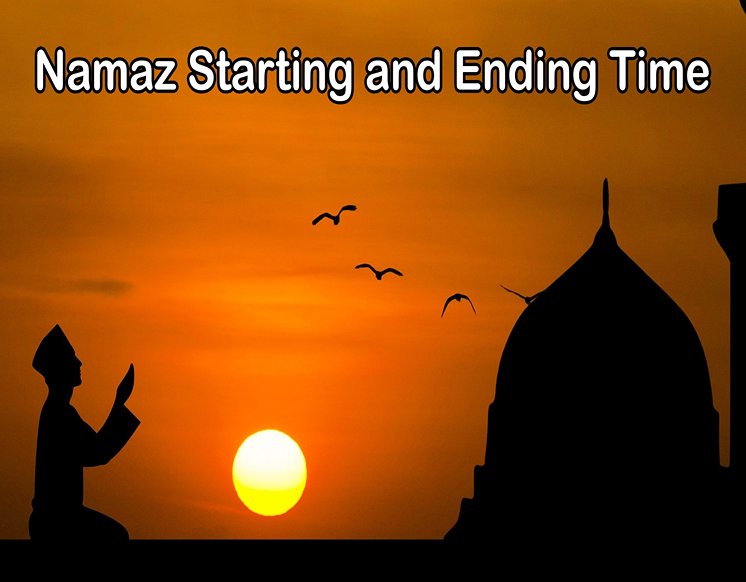Table of Contents
Namaz Starting and Ending Time
Namaz or Salah is an integral part of the Muslim faith. It is the way of communicating with Allah and seeking His blessings and mercy. The timing of Namaz is very important in Islam, and it is essential to offer it at the correct time. In this blog post, we will discuss the starting and ending time of Namaz. Namaz Starting and Ending Time
Starting time of Namaz:
The starting time of Namaz depends on the position of the sun. There are five daily prayers in Islam, and each has its specific time for offering. The first prayer of the day is Fajr, which starts at dawn when the first light appears in the sky. It is the time when the night is ending and the day is beginning. It is essential to offer Fajr prayer before sunrise.
The second prayer is Zuhr, which starts after the sun has crossed the meridian and starts declining. It is the time when the sun is at its highest point, and the shadow of an object is the shortest. Zuhr prayer can be offered until the shadow of an object is twice its length.
The third prayer is Asr, which starts when the shadow of an object is twice its length and ends when the sun starts to set. It is the time when the sun is inclined towards the west.
The fourth prayer is Maghrib, which starts immediately after the sun sets and ends when the redness in the sky disappears. It is the time when the day is ending, and the night is beginning.
The fifth prayer is Isha, which starts when the redness in the sky disappears and ends before midnight. It is the time when the night is at its peak, and the day is far away.
Ending time of Namaz:
It is essential to offer Namaz within its prescribed time. If one misses the time for offering a prayer, they should make it up as soon as possible. There is no specific ending time for Namaz, but it is better to offer it before the next prayer’s starting time. For example, if one misses the Fajr prayer, they should offer it before the Zuhr prayer’s starting time.
The timing of Namaz is critical in Islam, and it is essential to offer it within its prescribed time. Each prayer has its specific starting time, and it is better to offer it before the next prayer’s starting time. By offering Namaz at the right time, we can strengthen our relationship with Allah and seek His blessings and mercy.
The starting time of Namaz is determined by the position of the sun and is essential to offer the prayer at the exact time. This is because the timings of the prayers are designed to align with the natural cycles of day and night, and each prayer has a specific significance.
For example, Fajr prayer is the first prayer of the day and signifies the start of a new day, while Zuhr prayer signifies the midday and the need to take a break from work and offer thanks to Allah. Asr prayer signifies the late afternoon, Maghrib prayer signifies the end of the day, and Isha prayer signifies the end of the night and the start of a new day.
Furthermore, offering Namaz at the correct time helps to discipline oneself and cultivate a sense of mindfulness and awareness. It is a way to take a break from our busy lives and connect with Allah, seeking His guidance and blessings.
Regarding the ending time of Namaz, it is recommended to offer the prayer as soon as possible within its prescribed time. This is because the reward for offering the prayer decreases with each passing moment after its starting time. Additionally, it is essential to make up any missed prayers as soon as possible.
In Islam, prayer is considered to be one of the pillars of faith, and it is through prayer that one can strengthen their relationship with Allah. By offering Namaz at the correct time and fulfilling this religious obligation, one can attain inner peace and spiritual satisfaction.
The starting and ending time of Namaz is significant in Islam, and it is essential to offer the prayer within its prescribed time. By doing so, we can discipline ourselves, cultivate mindfulness, and strengthen our relationship with Allah. Namaz Starting and Ending Time
What are the correct timings of prayer?
In Islam, there are five daily prayers, each with its specific starting and ending time. The correct timings of prayer are as follows:
- Fajr Prayer: The Fajr prayer is the first prayer of the day, which is offered before sunrise. Its starting time is from the first light of dawn until just before sunrise. The Fajr prayer’s ending time is when the sun has risen enough to illuminate the horizon.
- Zuhr Prayer: The Zuhr prayer is offered after the sun has crossed the meridian and starts declining. Its starting time is when the sun is at its highest point, and the shadow of an object is the shortest. The Zuhr prayer’s ending time is when the shadow of an object is twice its length.
- Asr Prayer: The Asr prayer is offered in the late afternoon, when the sun starts to set. Its starting time is when the shadow of an object is twice its length, and the Asr prayer’s ending time is just before the sun sets.
- Maghrib Prayer: The Maghrib prayer is offered immediately after the sun sets. Its starting time is when the redness in the sky disappears, and the Maghrib prayer’s ending time is when the twilight disappears.
- Isha Prayer: The Isha prayer is the last prayer of the day, which is offered after the twilight disappears. Its starting time is when the redness in the sky disappears, and the Isha prayer’s ending time is before the middle of the night. Namaz Starting and Ending Time
It is essential to offer the prayer within its prescribed time, as it is considered a fundamental religious obligation in Islam. By offering the prayer at the correct time, one can strengthen their faith, cultivate mindfulness, and seek the blessings and mercy of Allah.
How long does namaz last?
The duration of Namaz or prayer varies depending on the type of prayer being performed. The five daily prayers in Islam have different lengths, and the duration of each prayer depends on the number of Rak’ahs (units of prayer) and the recitation of additional supplications.
Here is a breakdown of the approximate duration of each prayer:
- Fajr Prayer: The Fajr prayer consists of two Rak’ahs, and it takes around 5-10 minutes to perform.
- Zuhr Prayer: The Zuhr prayer consists of four Rak’ahs and takes around 10-15 minutes to perform.
- Asr Prayer: The Asr prayer consists of four Rak’ahs and takes around 10-15 minutes to perform.
4.Maghrib Prayer: The Maghrib prayer consists of three Rak’ahs and takes around 5-10 minutes to perform.
- Isha Prayer: The Isha prayer consists of four Rak’ahs and takes around 10-15 minutes to perform. Namaz Starting and Ending Time
It is worth noting that the duration of prayer can vary depending on the speed of the individual performing the prayer and the length of the recitation of supplications.
In addition, there are also additional voluntary prayers, such as the Tarawih prayer during the month of Ramadan, which can take longer to perform.
In Islam, prayer is considered a way to connect with Allah, seek His guidance and blessings, and attain inner peace and spiritual satisfaction. It is essential to perform the prayer with devotion and sincerity, focusing on the intention and the meaning behind each movement and supplication. Namaz Starting and Ending Time













